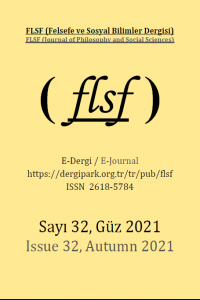Abstract
Bu çalışma genel itibariyle De Anima’daki duyumsama (aisthêsis) kavramından yola çıkmak suretiyle onun Logos ile ilişkisinin fenomenolojik olarak yorumlanışını ön plana almaktadır. Özel olarak söz konusu eserin Merleau-Ponty’nin Algının Fenomenolojisi adlı eserinde yürüttüğü fenomenolojik çalışma ile temas noktaları ve paralellikleri açımlanacaktır. Duyumsamanın ve sağladığı birlikte varoluş imkanının açtığı fenomenal dünya Merleau-Ponty’nin figür-zemin yapısından yola çıkarak Kartezyen bir başlangıç noktasından hareket etmeksizin ele alınabilmektedir. Çalışma tam da bu benzer perspektiften, De Anima’nın post-kartezyen anlamda “özne”siz bir felsefe yürüterek Logos’a göre açımlanan fenomenal dünyanın ve varlık alanının bir tür ontolojik temellendirmesini yaptığı iddiasını taşımaktadır. Akabinde ise böyle bir kabul yerini De Anima’daki ruhun yetileri (akletme ve duyumsama) arasındaki ilişkiyi fenomenolojik anlamda bilme meselesince aydınlatıp aydınlatmadığı ve De Anima’nın fenomenolojik bir kaynak olarak değerlendirilip değerlendirilemeyeceği hakkında bir soruşturmaya bırakmaktadır.
Keywords
References
- Aristotle (2016). De Anima. Çev. C. Shields. Oxford: Clarendon Press.
- Alloa, E. (2017). Resistance of the Sensible World: An Introduction to Merleau-Ponty. Çev. J. M. Todd. Newyork: Fordham University Press.
- Aristoteles (2019). Ruh Üzerine. Çev. Ö. Aygün & Y.G. Sev. İstanbul: Pinhan.
- Crubellier M, Pellegrin P. (2017). Aristoteles: Filozof ve Bilme Meselesi. Çev. B. G. Beşiktaşlıyan. İstanbul: Yapı Kredi Yayınları.
- Lear, J. (2020). Aristoteles: Anlama Arzusu. Çev. A. Yurdaçalış & İ. U. Kelso. İstanbul: Alfa.
- Merleau-Ponty, M. (2017) Algının Fenomenolojisi. Çev. E. Sarıkartal & E. Hacımuratoğlu. İstanbul: İthaki.
- Nussbaum, M.C (1995). Introduction. Essays on Aristotle’s De Anima. Ed. M.C Nussbaum & A.O Rorty. Chicago: Oxford University Press.
- Sorabji, R (2009). Body and Soul in Aristotle. Philosophy, 49/187. London: Cambridge University Press.
- Whiting, J. (1995) Living Bodies, Essays on Aristotle’s De Anima. Ed. M.C Nussbaum & A.O Rorty. Chicago: Oxford University Press.
Abstract
In general, this study focuses on the phenomenological interpretation of its relationship with the Logos, starting from the concept of sensation (aisthêsis) in De Anima. In particular, the contact points and parallels of the work in question will be revealed with the phenomenological study of Merleau-Ponty's Phenomenology of Perception. The phenomenal world opened up by sensation and the possibility of co-existence can be handled without moving from a Cartesian starting point, starting from Merleau-Ponty's figure-ground structure. From this similar perspective, the study claims that De Anima carries out a philosophy without a "subject" in the post-cartesian sense, making a kind of ontological grounding of the phenomenal world and the field of existence, which is revealed according to Logos. Subsequently, such an acknowledgment leaves its place to an investigation as to whether De Anima enlightens the relationship between the faculties of the soul in terms of phenomenological knowledge and whether De Anima can be considered as a phenomenological source.
Keywords
References
- Aristotle (2016). De Anima. Çev. C. Shields. Oxford: Clarendon Press.
- Alloa, E. (2017). Resistance of the Sensible World: An Introduction to Merleau-Ponty. Çev. J. M. Todd. Newyork: Fordham University Press.
- Aristoteles (2019). Ruh Üzerine. Çev. Ö. Aygün & Y.G. Sev. İstanbul: Pinhan.
- Crubellier M, Pellegrin P. (2017). Aristoteles: Filozof ve Bilme Meselesi. Çev. B. G. Beşiktaşlıyan. İstanbul: Yapı Kredi Yayınları.
- Lear, J. (2020). Aristoteles: Anlama Arzusu. Çev. A. Yurdaçalış & İ. U. Kelso. İstanbul: Alfa.
- Merleau-Ponty, M. (2017) Algının Fenomenolojisi. Çev. E. Sarıkartal & E. Hacımuratoğlu. İstanbul: İthaki.
- Nussbaum, M.C (1995). Introduction. Essays on Aristotle’s De Anima. Ed. M.C Nussbaum & A.O Rorty. Chicago: Oxford University Press.
- Sorabji, R (2009). Body and Soul in Aristotle. Philosophy, 49/187. London: Cambridge University Press.
- Whiting, J. (1995) Living Bodies, Essays on Aristotle’s De Anima. Ed. M.C Nussbaum & A.O Rorty. Chicago: Oxford University Press.
Details
| Primary Language | Turkish |
|---|---|
| Subjects | Philosophy |
| Journal Section | Articles |
| Authors | |
| Publication Date | December 9, 2021 |
| Submission Date | August 6, 2021 |
| Acceptance Date | October 22, 2021 |
| Published in Issue | Year 2021 Issue: 32 |
Starting from 2024, our journal will be published in 3 issues as two regular and one special issues. These issues will be published In May (regular issue), September (special issue) and December (regular issue).
Only articles within the scope of the file will be included in our special issue.
Thank you for your attention.

